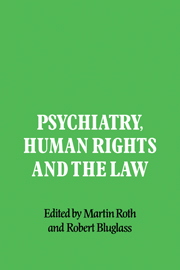Book contents
- Frontmatter
- Contents
- Editors' preface
- Contributors
- The historical background: the past 25 years since the Mental Health Act of 1959
- The social and medical consequences of recent legal reforms of mental health law in the USA: the criminalization of mental disorder
- The recent Mental Health Act in the United Kingdom: issues and perspectives
- Medical and social consequences of the Italian Psychiatric Care Act of 1978
- Lessons for the future drawn from United States legislation and experience
- Recent developments in relation to mental health and the law in the Federal Republic of Germany
- Psychopathy and dangerousness
- Dangerousness in social perspective
- Psychiatric explanations as excuses
- Detention of patients: administrative problems facing Mental Health Review Tribunals
- Developments in forensic psychiatry services in the National Health Service
- The role of psychiatry in prisons and ‘the right to punishment’
- Human rights in mental health
- Changes in mental health legislation as indicators of changing values and policies
- The Danish experience: one model of psychiatric testimony to courts of law
- A postscript on the discussions at the Cambridge Conference on Society, Psychiatry and the Law
The role of psychiatry in prisons and ‘the right to punishment’
Published online by Cambridge University Press: 04 August 2010
- Frontmatter
- Contents
- Editors' preface
- Contributors
- The historical background: the past 25 years since the Mental Health Act of 1959
- The social and medical consequences of recent legal reforms of mental health law in the USA: the criminalization of mental disorder
- The recent Mental Health Act in the United Kingdom: issues and perspectives
- Medical and social consequences of the Italian Psychiatric Care Act of 1978
- Lessons for the future drawn from United States legislation and experience
- Recent developments in relation to mental health and the law in the Federal Republic of Germany
- Psychopathy and dangerousness
- Dangerousness in social perspective
- Psychiatric explanations as excuses
- Detention of patients: administrative problems facing Mental Health Review Tribunals
- Developments in forensic psychiatry services in the National Health Service
- The role of psychiatry in prisons and ‘the right to punishment’
- Human rights in mental health
- Changes in mental health legislation as indicators of changing values and policies
- The Danish experience: one model of psychiatric testimony to courts of law
- A postscript on the discussions at the Cambridge Conference on Society, Psychiatry and the Law
Summary
The legitimacy of psychiatry in prisons
Imprisonment may be such a stress that on occasions it can produce mental breakdown. Anybody who has worked in prisons, whether for criminals or for other detainees such as prisoners of war, will have seen examples of so-called prison psychosis, a paranoid delusional or hallucinatory state importing lots of prison paraphernalia into its content that tends to occur in personality disorders and remits when freedom is regained. Equally it is common to see severe, highly understandable depressions at the beginning of a long sentence, or at a point where an individual begins to comprehend the enormity of the events which led him to prison – perhaps a killing. The increased suicide rate in prisons, especially during the first few months of imprisonment, is probably related, in part, to depressions of this kind.
Some would say that not only do prisons generate psychiatric problems but they also collect them inappropriately and act as unofficial mental hospitals for individuals who should be in health care. A mental health census within the English prison system has estimated that approximately one third of sentenced men could be regarded as psychiatric cases (Gunn et al. 1978). This is not to suggest that all these men required inpatient care. The majority were suffering from personality disorders, chronic neuroses, alcoholism, and drug dependency. Nevertheless 20% had previously been patients in the National Health Service (NHS) and many showed severe anxiety and depression; perhaps 1% were psychotic.
- Type
- Chapter
- Information
- Psychiatry, Human Rights and the Law , pp. 138 - 147Publisher: Cambridge University PressPrint publication year: 1985



